
Stock image for illustration purposes only - book cover, edition or condition may vary.
The Politics of Peacemaking in Africa: Non-State Actors´ Role in the Liberian Civil War
Babatunde Tolu Afolabi
€ 97.45
FREE Delivery in Ireland
Description for The Politics of Peacemaking in Africa: Non-State Actors´ Role in the Liberian Civil War
Hardback. A detailed examination of the role of two critical non-state groups in the Liberian Civil War peace process - the diaspora and the religious - that provides key insights for policymakers and NGOs into the roles that civil society actors can play in conflict resolution and peacemaking. Series: Western Africa Series. Num Pages: 192 pages. BIC Classification: HBG. Category: (P) Professional & Vocational. Dimension: 234 x 156 x 15. Weight in Grams: 666.
'Throws light on the role of several key agents in bringing to an end one of the darkest episodes in post-independence African history.' Ebenezer Obadare, University of Kansas Until the 1990s, conflict resolution and peacemaking fell to states, the UN and other intergovernmental organizations. In recent times it is non-armed, non-state actors who have had a pivotal role in seeking to resolve civil wars in Africa. This book examines, for the first time, through an examination of the Liberian Civil War in particular, how non-state actors have impacted upon peace processes. The Liberian Civil War was the first post-Cold War intra-state conflict in West Africa and exemplified the new wars breaking out on the continent. The peace process that followed showed how future peacemaking processes might evolve, being not only the first in which a regional economic grouping had a role - in this case ECOWAS - but also involving non-state religious and diaspora actors. Religious actors, initiators of the Liberian peace process, were mediators, dialogue facilitators, watchdogs and trustees of the entire peace process. Although their efforts were mainly influenced by the desire to fulfil the divine mandate to tend to the flock , they were also able to regain some of the societal influence that organized religion, especially Christianity, enjoyed during the 158 years of minority Americo-Liberian rule. Diaspora actors' roles ranged from being founders and sponsors of warring factions to providing succour to Liberians back home through remittances and engaging in the peace process. Babatunde T. Afolabi is a Senior Programme Manager at the Centre for Humanitarian Dialogue (HD). He had previously worked at the ECOWAS Commission where he was involved in peace processes across West Africa.
Product Details
Publisher
James Currey
Format
Hardback
Publication date
2017
Series
Western Africa Series
Condition
New
Number of Pages
215
Place of Publication
Oxford, United Kingdom
ISBN
9781847011589
SKU
V9781847011589
Shipping Time
Usually ships in 7 to 11 working days
Ref
99-47
Reviews for The Politics of Peacemaking in Africa: Non-State Actors´ Role in the Liberian Civil War
[P]rovides a rich literature on the role of civil society in peacekeeping that could provide valuable lesson on how civil society can play a pivotal role in the re-engineering of societies and polity as is the case of Liberia. I recommend this book to students and academics who are interested in the nature of peacemaking in developing states and to policy analysts and other practitioners who are engaged in projects that are related to the role of non-state actors in conflict resolution and peacekeeping in Africa. AFRICAN STUDIES QUARTERLY
